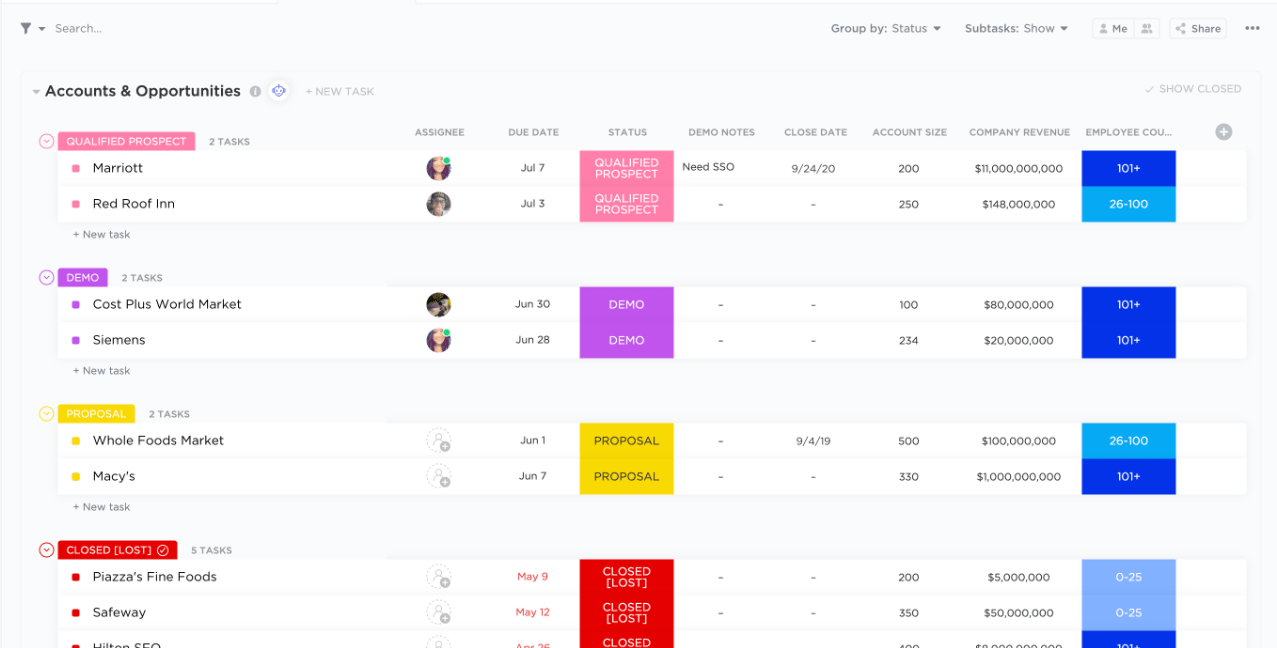Customers are the backbone of any business. That’s why it’s essential for organizations to learn how to best attract, nurture, and retain them. As a business owner, you know the value of building a solid client base and creating lasting relationships.
Unfortunately, it’s sometimes a challenge to be proactive in customer relationship management while running your business, which is why CRM software platforms such as Microsoft Dynamics 365 come in handy.
CRM software offers several benefits to sales teams and your marketing efforts. A Capterra study found 45% of businesses replace generic tools with CRM software to see an increase in revenue growth and customer retention. Additionally, separate Salesforce research discovered 68% of marketing leaders measure customer experience as a priority marketing KPI.
But let’s be real—not every business finds Microsoft Dynamics 365 as the end-all-be-all solution. That’s why so many organizations look for the best Microsoft Dynamics alternatives available to fit their specific needs.
And that’s why we’re here!
We’re highlighting 10 Microsoft Dynamic alternatives that can work better for you. We’ll also include details around pricing, target audiences, and available Enterprise Resource Planning (ERP) and CRM features.
First, let’s figure out what Microsoft Dynamics is, how it works, and its ideal customer profile (which might not be you)!
What Is Microsoft Dynamics?
Microsoft Dynamics is a CRM and ERP platform that offers a suite of integrated tools to help businesses conduct multiple tasks and smoothly run operations.
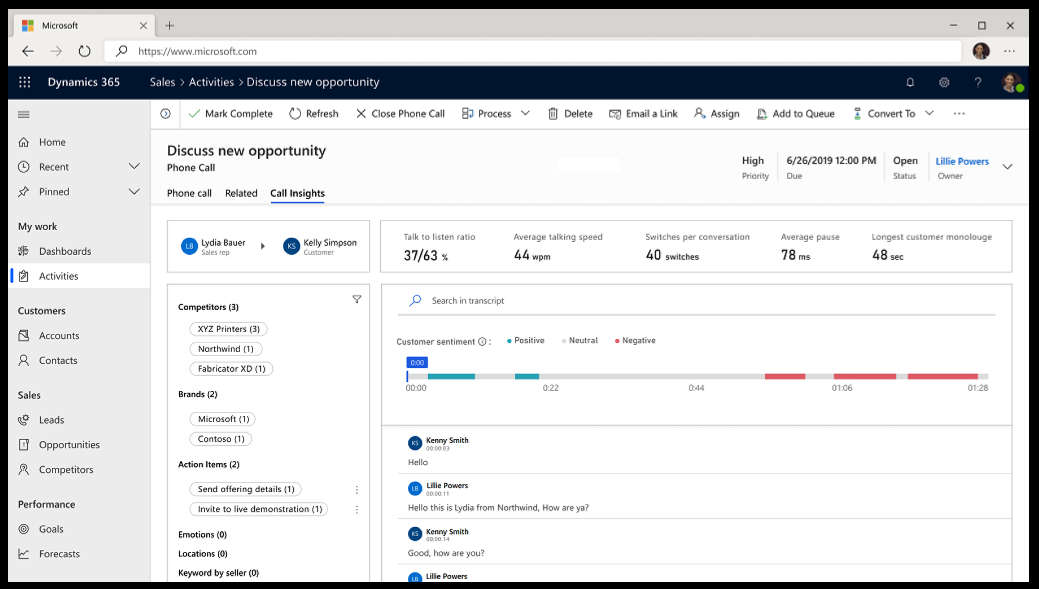
This go-to CRM software has robust capabilities, including editable grids, sitemap designers, and powerful business intelligence (BI), offering companies complete visibility and control. The biggest perk of the Microsoft Dynamics CRM system is it contains an easy-to-use customizable dashboard to display priorities and sales data in a single interface.
The Microsoft Dynamics CRM system also has a wide range of cloud-based business apps to support mobile device operations and enable sales managers and many others to work on the fly.
Popular Microsoft Dynamics CRM features
- Customer data insights: Easily use AI to discover data and sales insights
- Customer service dashboard: Allows teams to review their customer experiences and find ways to improve
- Real-time customer interaction alerts: Get immediate updates on important customer interactions with your business
- Unifying data: Centralize sales pipelines and data across all integrated applications
- Versium Predict: Helps your sales or marketing team better predict customer purchases
Microsoft Dynamics pricing
Pricing for this platform is pretty dynamic itself. Check its pricing page for the clearest information.
- Customer Data Platform (Customer Insights): $1,500 per tenant per month for the first Dynamics 365 app
- Professional (Sales): $65 per user per month
- Enterprise (Sales): $95 per user per month
- Premium (Sales): $135 per user per month
Top 10 Microsoft Dynamics Alternatives to Consider
If you’re ready to look for a new business management software or CRM solution, check out these 10 options to better suite your organization:
1. ClickUp
ClickUp offers team collaboration and project management solutions, so sales and marketing teams align and increase communication while staying up to date on tasks and data. This CRM has a flexible range of options, and its free version is perfect for low-budget businesses looking to save money while remaining productive.
This platform makes it simple to build high-level views into customer lifetime value, average deal sizes, and so much more to monitor data in one space. ClickUp’s efficient data management features break silos by speeding up communications, so teams collaborate better across deals and onboard customers in a single hub.
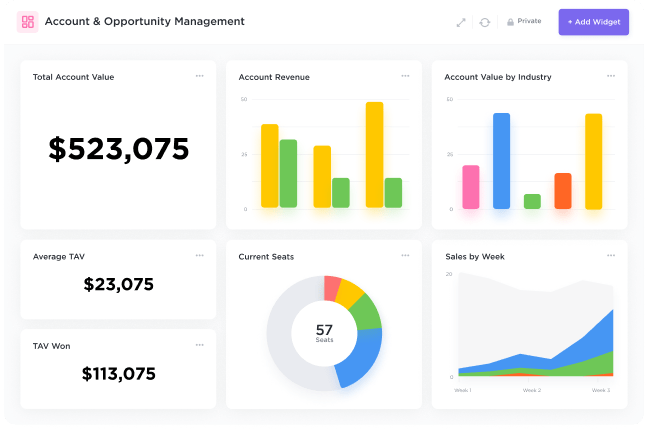
Want to still connect to third-party tools? ClickUp boasts plenty of integrations, including Google Drive, Evernote, Slack, and Dropbox to help teams centralize Workspaces.
ClickUp key features
- 10+ customizable project management views to visualize your sales pipeline and orders
- Email integration platform integrates seamlessly with businesses
- Automate marketing campaigns, sales pipelines, and more to save time
- Simple client onboarding to increase customer loyalty and interactions
- Reporting and analytics tools to track and measure your KPIs
- Custom fields to track orders, customer satisfaction, or add client data for better sales pipeline management
ClickUp pros
- An extensive free plan that offers several features
- Business software for all sizes
- Revenue management capabilities
- Easily import data from other tools
- Wide variety of CRM templates (Download this ClickUp CRM template!)
- Stellar customer service
ClickUp cons
- The robust features can overwhelm some users
- Lack of AI prediction software
ClickUp pricing
ClickUp ratings
- G2: 4.7/5 (4,511+ reviews)
- Capterra: 4.7/5 (2,986+ reviews)
📮ClickUp Insight: 83% of knowledge workers rely primarily on email and chat for team communication. However, nearly 60% of their workday is lost switching between these tools and searching for information. With an everything app for work like ClickUp, your project management, messaging, emails, and chats all converge in one place! It’s time to centralize and energize!
2. HubSpot CRM
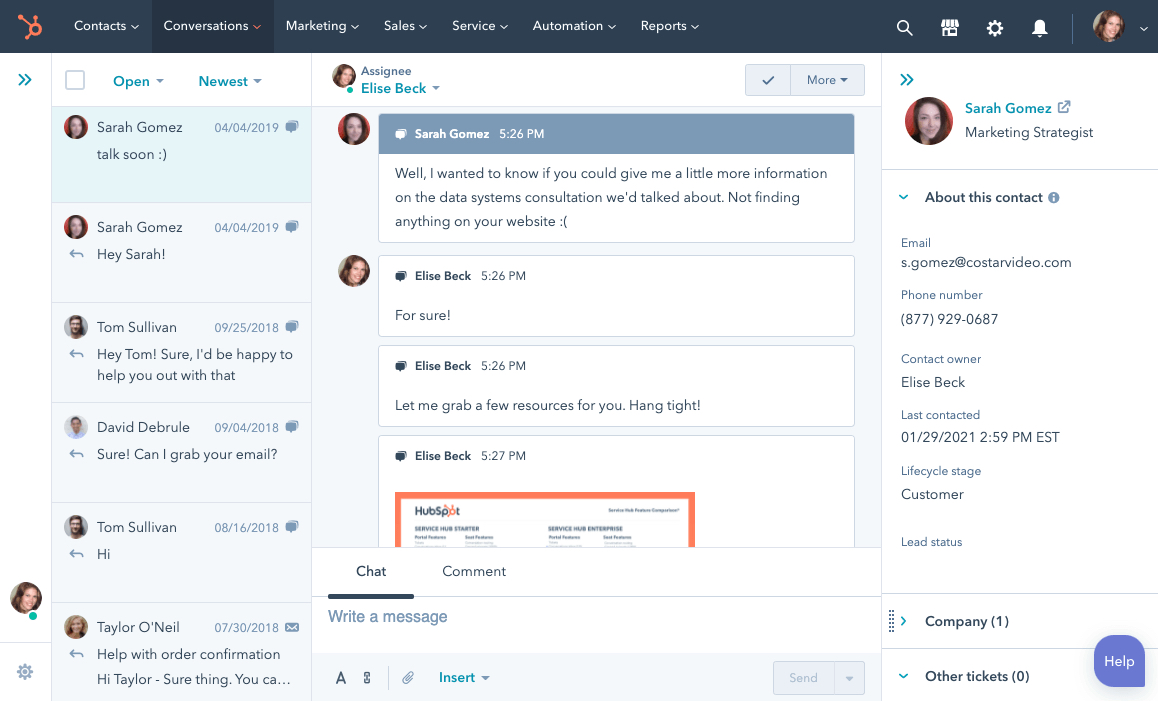
HubSpot CRM is a great small business CRM platform with accounting software to manage business processes, communication, sales data, and more. It’s free and easy to use with plenty of comprehensive features that beginners and seasoned SaaS users can use anywhere and anytime. Additionally, it allows you to store detailed customer and company profiles with visual cues.
What’s more, you can automate key CRM processes such as internal team notifications and marketing emails which let you create a knowledge base for your clients of documentation and help articles.
HubSpot CRM is a certified Google partner and offers solutions that fit all niches and industries. It integrates seamlessly with Cortana, GoChime, Pipedrive CRM, Gravity Forms, and other business systems.
HubSpot key features
- Drag-and-drop communicator for faster communication and collaboration
- Ticketing platform for top-notch customer service and support to your clients
- Intuitive dashboard that gives you an overview of your recent KPIs and activity
HubSpot pros
- Easy to set up
- Intuitive
- Affordable
HubSpot cons
- It has a learning curve
- Not an all-in-one tool
- Templates are difficult to modify
HubSpot pricing
- Free plan: Free forever
- Starter: $45 per month
- Professional: $800 per month
- Enterprise: $3200 per month
HubSpot ratings
- G2: 4.4/5 (9,206+ reviews)
- Capterra: 4.5/5 (3,363+ reviews)
3. Starter Suite by Salesforce
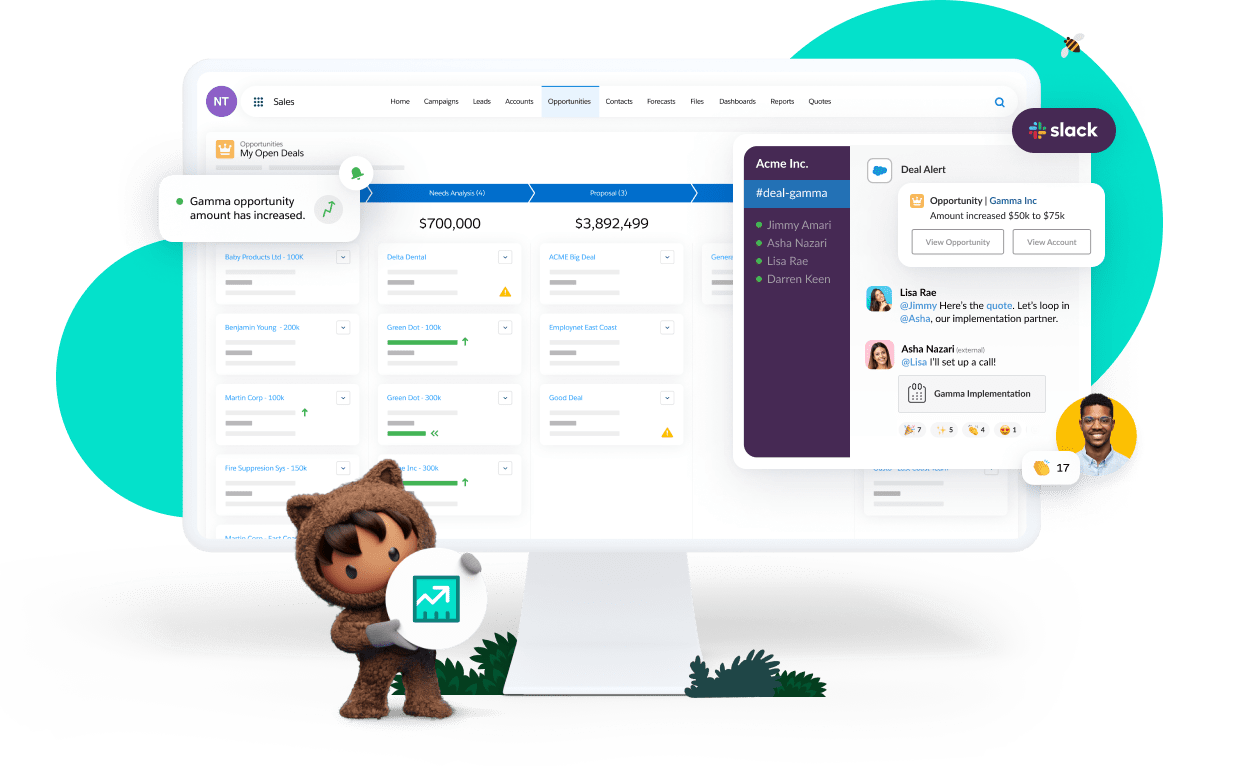
Starter Suite by Salesforce is an integrated platform that allows companies to connect effectively with their clients. Starter Suite is ideal for small businesses and startups looking to gain a 360-degree view of their clients to deliver personalized interactions.
Starter Suite integrates your marketing, sales, service, and commerce tools together. With a simplified onboarding process, it offers basic CRM features for managing email campaigns, tracking leads, and customer engagement.
Starter Suite key features
- Contact management
- Lead management
- Opportunity management
- Marketing automation functionality for ease of CRM workflow setup
- Send personalized messages to prospective customers
- Modules for real-time analytics, customer service, and commerce
Starter Suite pros
- Customizable dashboard
- Easy to navigate and automate industry workflows
- Social media function is easy to use for many users
Starter Suite cons
- No lifetime free version
- Complex
- Tricky reporting
- Difficult technical support
Starter Suite pricing
- Free trial available
- Starter Suite: $25 per user per month
Starter Suite ratings
- G2: 4.2/5 (15,218+ reviews)
- Capterra: 4.4/5 (17,156+ reviews)
Learn how Salesforce integrates with ClickUp!
4. Oracle NetSuite CRM
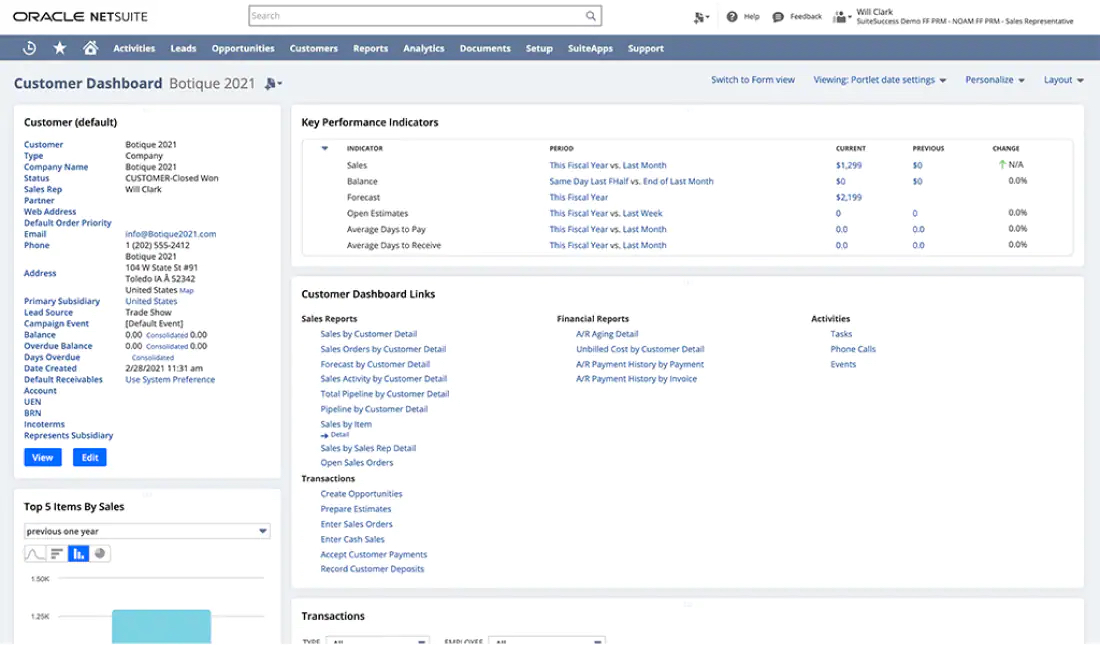
Oracle NetSuite CRM is similar and a common alternative to Microsoft Dynamics. As a cloud-based sales CRM, you get an uninterrupted stream of information based on the lifecycle of your customer engagement.
The platform includes traditional and modern capabilities to promote growth and drive revenue for your business while giving you a real-time 360-degree view of your patrons’ activities. This integrated CRM platform then enables your sales team to enforce proactive strategies throughout the sales process.
NetSuite CRM key features
- Customer data and sales pipeline management
- Sales automation
- Customer service management
- Ecommerce marketing automation
- Partner relationship management
- Time tracking
- Sales forecasting
- Third-party integrations
NetSuite CRM pros
- Customizable mobile app
- User-friendly interface
- Automatic update process
- Accessible data storage
NetSuite CRM cons
- Can be slow
- Tricky creating advanced searches or reports
NetSuite CRM pricing
The platform doesn’t feature its pricing plans publicly. Anyone interested in their services has to reach out to the vendor and schedule a consultation to draft a reasonable subscription plan for their budget and preferences.
NetSuite CRM ratings
- G2: 3.9/5 (1,902+ reviews)
- Capterra: 4.1/5 (843+ reviews)
5. Pipedrive
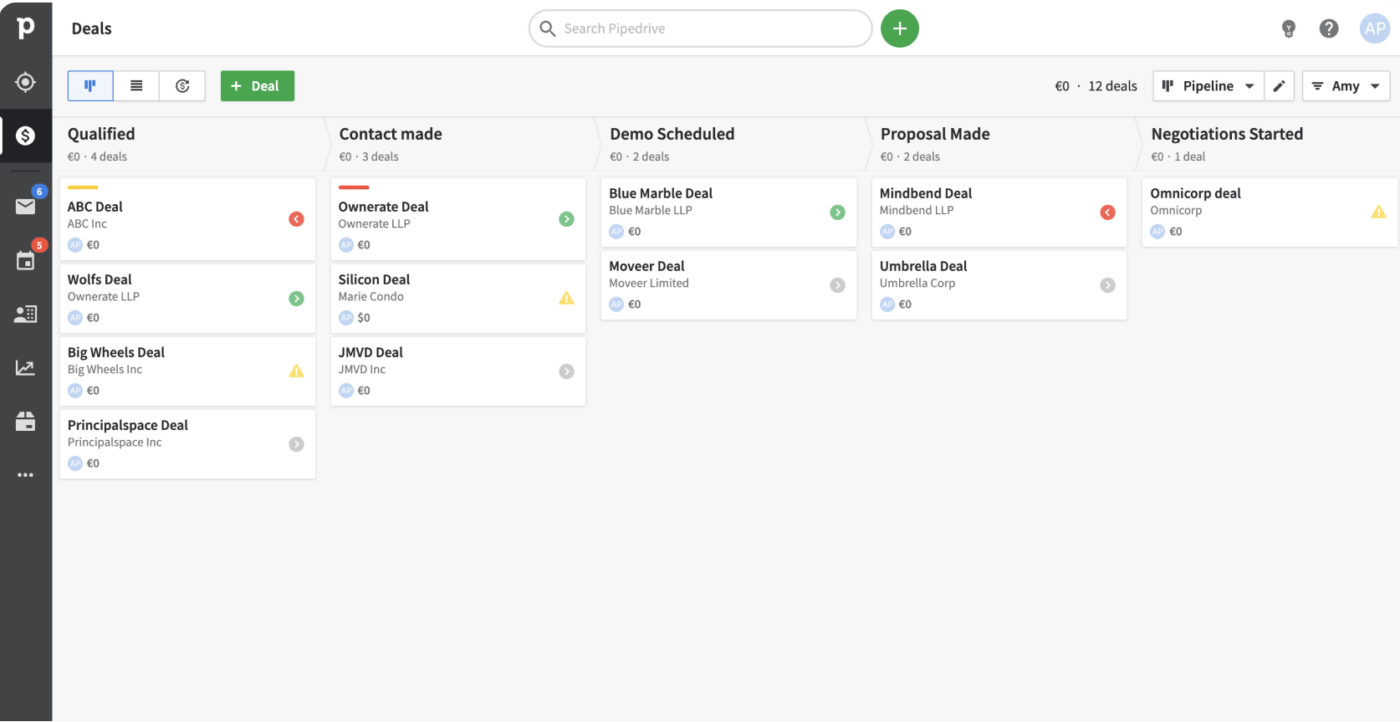
If your company’s sales team needs a simple to use yet powerful platform for sales and marketing campaigns and daily task organization, then Pipedrive is the best choice. The platform has a minimalist layout that simplifies lead management. Immediately you sign into Pipedrive, you’ll get an overview of your sales pipeline and can hone in on the deals you want to get a move on.
The platform has a goal and activity feature that lets you see the activities that require your immediate attention and gives you a status on your ongoing jobs. What’s more, Pipedrive connects seamlessly to major email service providers like Outlook, Gmail, and Yahoo! allowing you to send and receive messages without leaving the CRM easily. It also integrates with Zapier, Trello, Mailchimp, and Google Maps.
Pipedrive key features
- Email tracking
- Workflow automation
- Powerful API
- Sales reporting and analytics
Pipedrive pros
- Intuitive interface
- Easy to use
- 24/7 support
Pipedrive cons
- Limited third-party integrations
Pipedrive pricing
- Essential: $9.90
- Advanced: $19.90
- Professional: $39.90
- Enterprise: $59.90
Pipedrive ratings
- G2: 4.2/5 (1,537+ reviews)
- Capterra: 4.5/5 (2,429+ reviews)
6. Copper
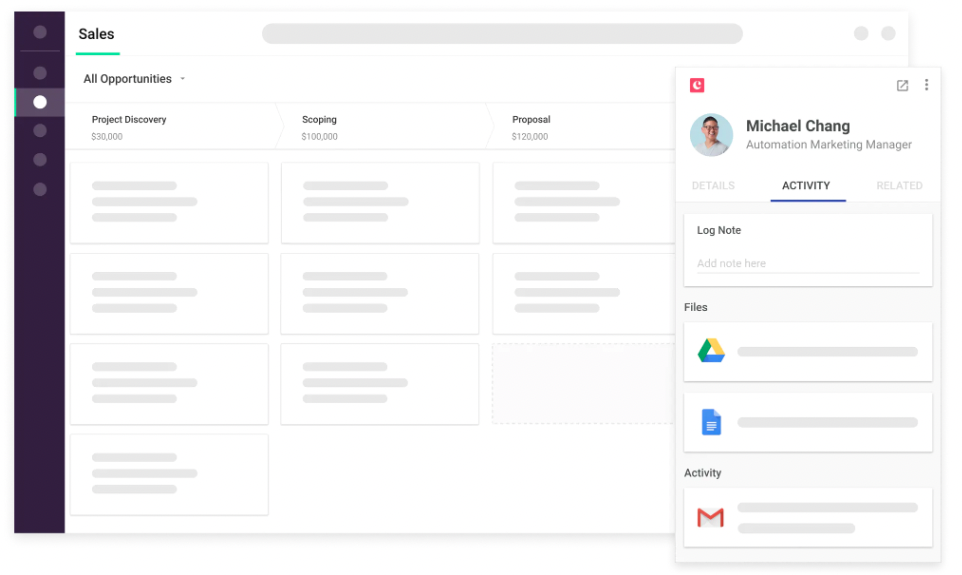
For our list of Microsoft Dynamics alternatives, Copper makes the cut because of its comprehensive relationship managing features. The software allows you to drive customer satisfaction with better interactions from your sales and marketing tactics.
For CRM systems, this tool was created with flexibility as its main function. It combines collaboration solutions, analytics tools, and productivity features and wraps them up in one convenient interface. You can automate core operations and business functions to increase productivity and streamline your workflow for visibility into your pipeline.
Copper CRM key features
- Email open tracking
- Email templates
- CRM activity reporting
- Custom fields
- Goal tracking
- Business operations forecasting
- Third-party integrations
Copper CRM pros
- Intuitive user interface
- Fast customer service response
- Highly customizable
- Strong API
Copper CRM cons
- Some users report difficulty in cancelations
- No freemium version
Copper CRM pricing
- Basic: $29 per user per month
- Professional: $69 per user per month
- Business: $129 per user per month
Copper CRM ratings
- G2: 4.5/5 (985+ reviews)
- Capterra: 4.4/5 (554+ reviews)
7. Zoho CRM
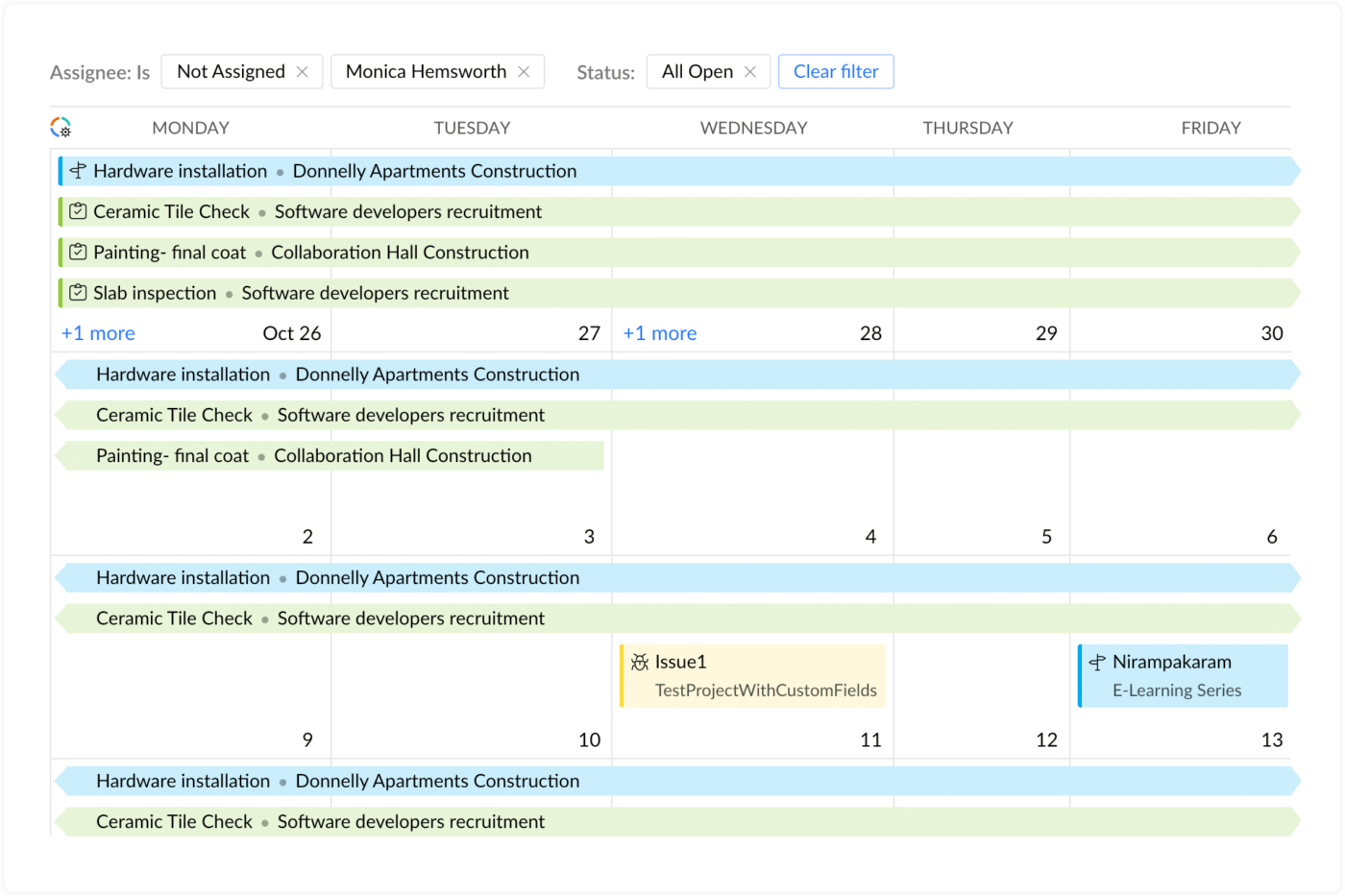
Zoho CRM is a CRM software containing all the features needed for a business to streamline its relevant processes. This software is commonly used for small businesses and start-ups due to its freemium package and cost-effective upgrades.
Zoho is one of the more flexible Microsoft Dynamics alternatives to better tailor your workflows while customizing products, landing pages, and customer journeys. Additionally, you can easily learn the software and be able to customize its menus to suit your company’s CRM needs.
This CRM solution excels in automating sales processes and providing businesses with a real omnichannel platform. Zoho helps teams communicate with prospective clients and existing customers through email, phone, social media, and other portals.
A significant advantage of Zoho CRM is that integrating it with third-party solutions is straightforward.
Zoho CRM key features
- Compatible with more than 400 applications, including Zoho CRM, HubSpot, PayPal, and Mailchimp
- Calendar management
- Interaction tracking
- Email tracking
- Smart Chat
- Social CRM
- Forecasting
Zoho CRM pros
- Easy to use
- You can track engagement
- Freemium version has extensive features
Zoho CRM cons
- Clunky design that may be a turn off
- Some report customer support problems with complex issues
- Bugs and glitches can make it challenging
Zoho CRM pricing
- Standard: $12 per user per month
- Professional: $20/ user per month
- Enterprise: $35 per user per month
- Ultimate: $45 per user per month
Zoho CRM ratings
- G2: 4.4/5 (15,433+ reviews)
- Capterra: 4.3/5 (5,719+ reviews)
8. Freshsales
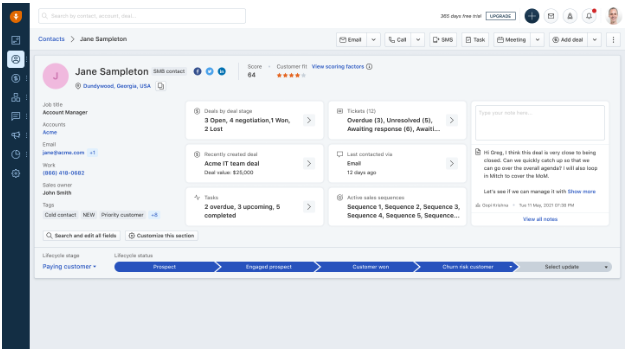
Formerly Freshworks CRM, Freshsales customer relationship management software is made for high-velocity businesses that require a single point contact with leads. This sales CRM platform allows teams to attract, manage, and engage leads with an intuitive UI.
Its CRM software has powerful features like AI-based lead scoring, phone and email functions, customizable dashboards and reports, and workflow automation.
You can easily integrate Freshsales CRM with other solutions from Freshdesk, such as Freshcaller. Freshsales CRM also uses an open API system, meaning you can integrate it with apps you usually use in your company, such as Mailchimp, Google Calendar, and QuickBooks.
Freshsales key features
- Advanced customization
- Multiple pipeline management
- Advanced reporting
- Intelligent workflows
- Lead scoring
- Event tracking
Freshsales pros
- Clean and simple to use
- Offers robust features
- Flexible sales process
- Responsive development team
Freshsales cons
- Lack of options when exporting information
- Few accessibility options
Freshsales pricing
- Free
- Growth: $15 per user per month
- Pro: $39 per user per month
- Enterprise: $69 per user per month
Freshsales ratings
- G2: 4.6/5 (983+ reviews)
- Capterra: 4.6/5 (496+ reviews)
9. Pipeline CRM
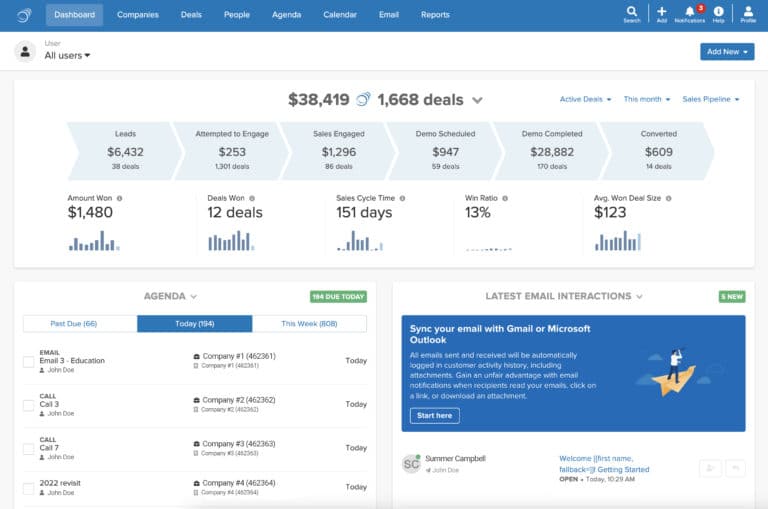
Pipeline CRM is popular among small businesses because it allows users to qualify leads, manage their contacts, and track prospects within a single cloud-based program. Formerly PipelineDeals, this tool provides sales management and customer relationship management with daily real-time status updates and 3D charts.
Pipeline CRM key features
- Email and app integration
- Sales acceleration tools reduce the sales cycle and increase the conversion rate
- Nurture leads
- Shared pipeline
- Custom data field for users to save as many details as they want
- Email tracking
- Import existing data in bulk
Pipeline CRM pros
- Simple customer relationship management user interface
- A 14-day free trial to assess which pricing plan is best for you
- Comprehensive and easy-to-use dashboard for sales teams
- Easy accessibility
- Simple to setup for a CRM system
Pipeline CRM cons
- No lifetime free version
- Limited integrations with third-party sites
- The robust sales CRM features may be overwhelming for some
Pipeline CRM pricing
- Start: $25 per user per month
- Develop: $33 per user per month
- Grow: $49 per user per month
Pipeline CRM ratings
- G2: 4.4/5 (902+ reviews)
- Capterra: 4.4/5 (611+ reviews)
10. Nimble CRM
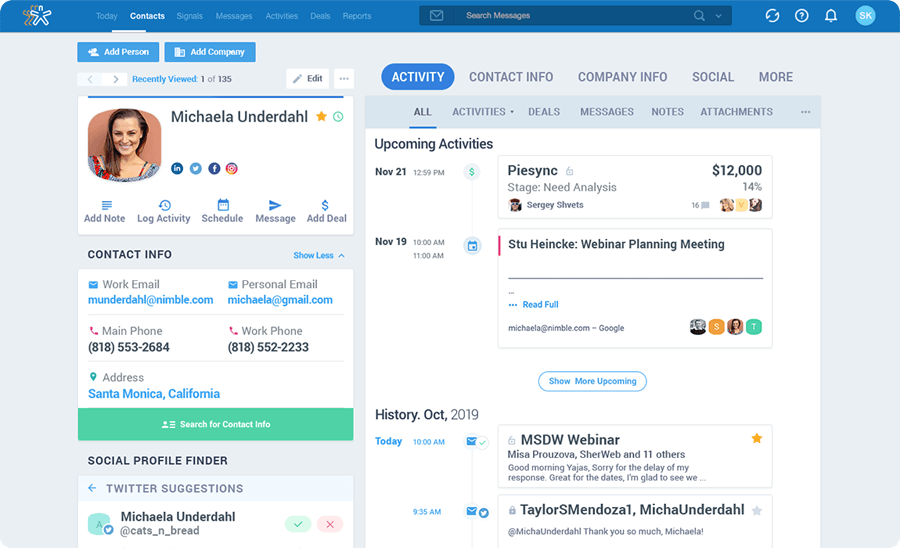
On our list of Microsoft Dynamics alternatives, this top CRM software is a communication-focused tool that simplifies the process of maintaining contact with your leads and customers. Nimble CRM has advanced features for lead management workflows that help both small business and enterprise teams.
It also provides a user-friendly way of managing messages and social media to better segment clients. Using the prospector tool lets you obtain valuable contacts from websites by visiting a company’s site.
Once the contacts are in your database, you can categorize them accordingly and use the custom fields options to create tags and make a flexible list.
Nimble key features
- The dashboard provides an overview of the day ahead
- Message tracking
- Email tracking
- Third-party integration
- The Signals feature lets you see who’s engaging with you
- Browse social media without leaving the software
Nimble pros
- Customizable
- User friendly
- Easy collaboration
- Facilitate lead management faster
Nimble cons
- You are limited to 10 contacts per user per month with the prospector tool
- There’s a learning curve
- The mobile app doesn’t work well
Nimble pricing
This software has a unique approach with only one pricing option.
- Nimble Business: $19 per user per month
Nimble ratings
- G2: 4.5/5 (984+ reviews)
- Capterra: 4.4/5 (1,774+ reviews)
Find the Right CRM for Your Business
While Dynamics 365 is an excellent option trusted by several enterprise teams, it’s not the only option out there—especially for small business organizations. There isn’t a one-size-fits-all solution for CRM tools, but you can pick something that works best for you and your budget.
Understanding your operations down to every detail can help you determine which platform will help you grow your business and enhance client relationships.
ClickUp gives you several features such as process automation, improved communication, intuitive project management, and easier team collaboration functions. Give ClickUp a try for free today to see why so many businesses make the move!


